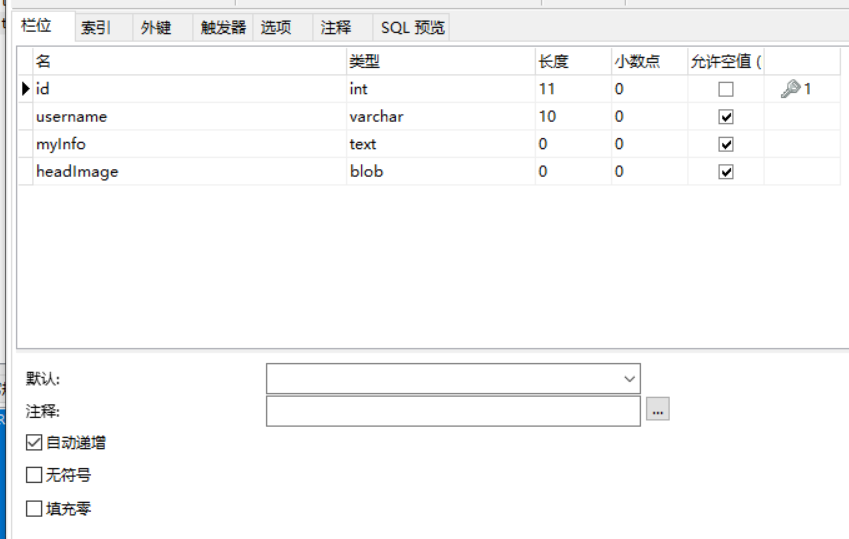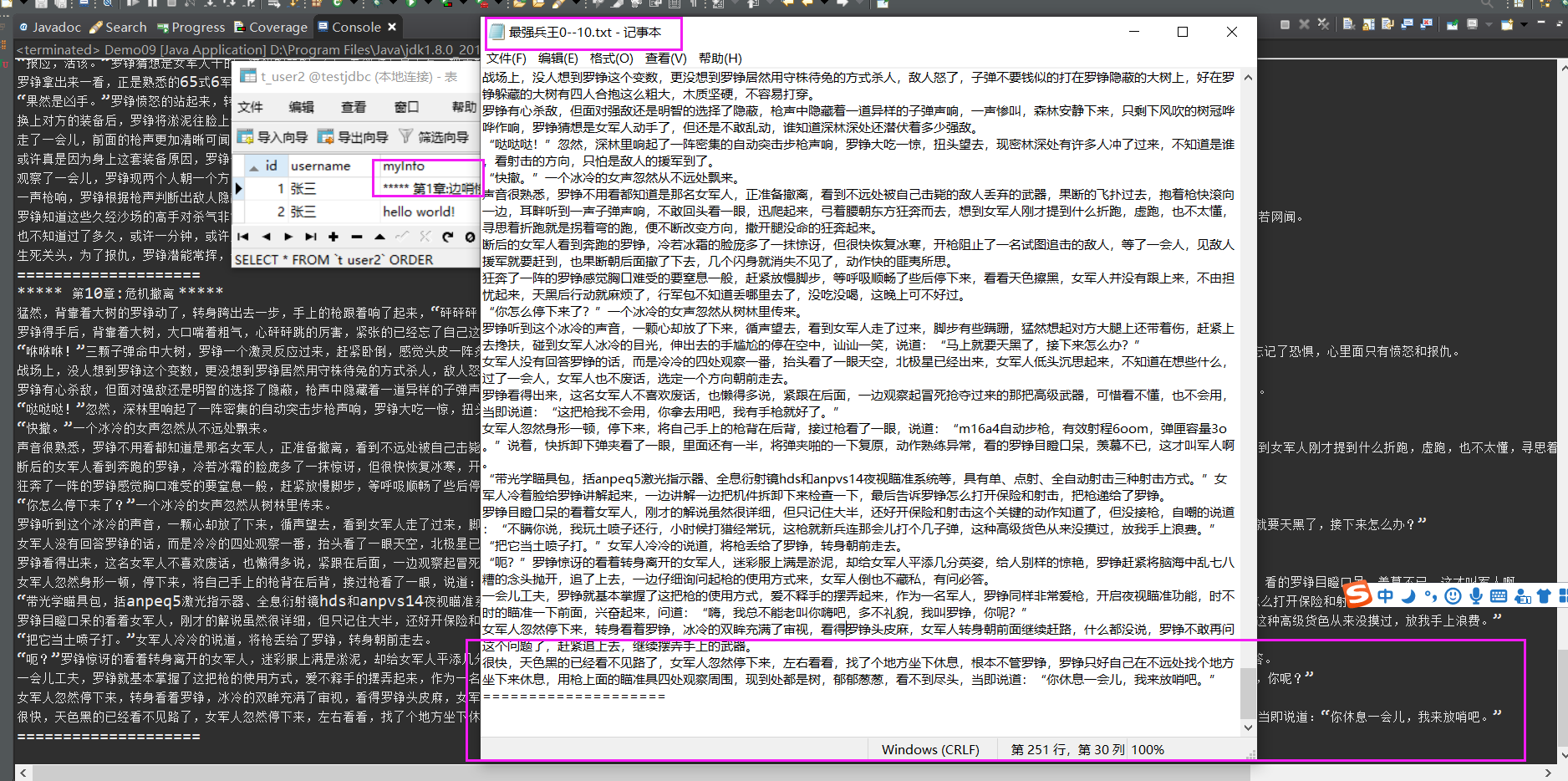在数据库中:
clob用于存储大量的文本数据
可以使用字符流操作
clob用于存储大量的二进制数据
可以使用字节流操作
以mysql为例 先准备一张表:
CREATE TABLE `t_user2` (
`id` int(11) NOT NULL AUTO_INCREMENT,
`username` varchar(10) DEFAULT NULL,
`myInfo` text,
`headImage` blob,
PRIMARY KEY (`id`)
) ENGINE=InnoDB AUTO_INCREMENT=4 DEFAULT CHARSET=utf8;

ClOB 操作:
public static void main(String[] args) {
Connection conn = null;
PreparedStatement ps = null;
ResultSet rs = null;
BufferedReader br = null;
try {
// 加载驱动类
Class.forName("com.mysql.jdbc.Driver");
// 建立连接
conn = DriverManager.getConnection("jdbc:mysql://localhost:3306/testjdbc?useSSL=false", "root", "123456");
/*存入
* ps = conn.prepareStatement("insert into t_user2 (username, myInfo) values(?, ?)");
ps.setString(1, "张三");
// ps.setClob(2, new FileReader(new File("f:/temp/最强兵王0--10.txt")));
ps.setClob(2, new BufferedReader(
new InputStreamReader(new ByteArrayInputStream("hello world!".getBytes()))));
ps.executeUpdate();*/
// 取出
ps = conn.prepareStatement("select * from t_user2 where id = ?");
ps.setInt(1, 2);
rs = ps.executeQuery();
while(rs.next()) {
Clob clob = rs.getClob("myInfo");
br = new BufferedReader(clob.getCharacterStream());
String line;
while((line = br.readLine()) != null) {
System.out.println(line);
}
}
} catch (Exception e) {
e.printStackTrace();
}finally {
try {
if(br != null) {
br.close();
}
} catch (IOException e) {
e.printStackTrace();
}
try {
if(rs != null) {
rs.close();
}
} catch (SQLException e) {
e.printStackTrace();
}
try {
if(ps != null) {
ps.close();
}
} catch (SQLException e) {
e.printStackTrace();
}
try {
if(conn != null) {
conn.close();
}
} catch (SQLException e) {
e.printStackTrace();
}
}
}
运行代码:

可以看到我把存入的小说又读出来了
blob操作
public static void main(String[] args) {
Connection conn = null;
PreparedStatement ps = null;
ResultSet rs = null;
BufferedReader br = null;
ByteArrayInputStream bis = null;
FileOutputStream fos = null;
try {
// 加载驱动类
Class.forName("com.mysql.jdbc.Driver");
// 建立连接
conn = DriverManager.getConnection("jdbc:mysql://localhost:3306/testjdbc?useSSL=false", "root", "123456");
//存入
/*ps = conn.prepareStatement("insert into t_user2 (username, headImage) values(?, ?)");
ps.setString(1, "张飞");
ps.setBlob(2, new BufferedInputStream(new FileInputStream("f:/aa/temp/张飞.jpg")));
ps.executeUpdate();*/
// 取出
ps = conn.prepareStatement("select * from t_user2 where id = ?");
ps.setInt(1, 3);
rs = ps.executeQuery();
while(rs.next()) {
Blob blob = rs.getBlob("headImage");
bis = (ByteArrayInputStream) blob.getBinaryStream();
ByteArrayOutputStream bos = new ByteArrayOutputStream();
byte[] flush = new byte[1024];
int len;
while((len = bis.read(flush)) != -1) {
bos.write(flush, 0, len);
}
fos = new FileOutputStream("f:/aa/a.jpg");
fos.write(bos.toByteArray());
fos.flush();
}
} catch (Exception e) {
e.printStackTrace();
}finally {
try {
if(fos != null) {
fos.close();
}
} catch (IOException e) {
e.printStackTrace();
}
try {
if(br != null) {
br.close();
}
} catch (IOException e) {
e.printStackTrace();
}
try {
if(rs != null) {
rs.close();
}
} catch (SQLException e) {
e.printStackTrace();
}
try {
if(ps != null) {
ps.close();
}
} catch (SQLException e) {
e.printStackTrace();
}
try {
if(conn != null) {
conn.close();
}
} catch (SQLException e) {
e.printStackTrace();
}
}
}
运行测试:
{{uploading-image-960855.png(uploading...)}}
存入的图片又回来了